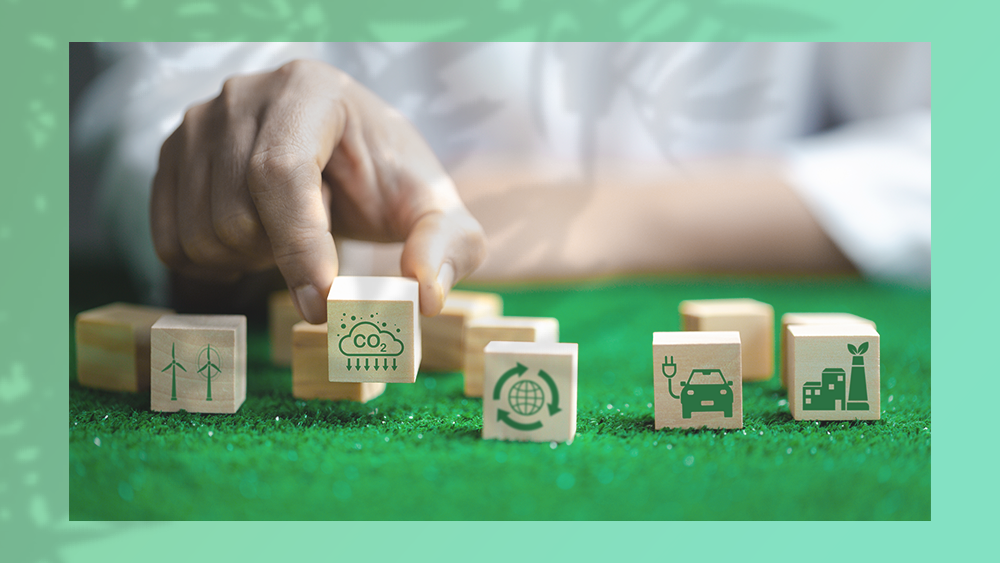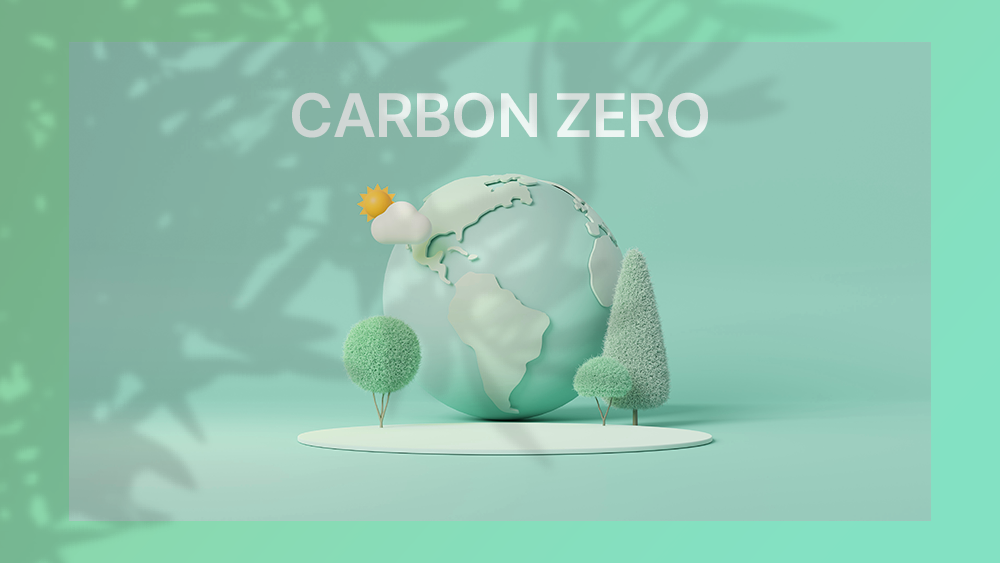RE:GEN 2. Carbon Reduction
2023.06.13
The Earth is suffering from unprecedented droughts, heatwaves, and unexpected climate anomalies. In South Korea, the distinct four seasons are changing, and we are witnessing a shift towards a subtropical climate, where heavy rainfalls are localized. The global phenomenon of abnormal weather patterns may have multiple causes, but the most significant problem is the greenhouse effect. The increase in carbon dioxide emissions from using fossil fuels and deforestation is gradually elevating the Earth's temperature, threatening climate change and human safety. Climate change has become an issue that can no longer be postponed. Hyosung believes that this is a time when proactive responses are needed; thus it is making efforts across all business operations to minimize the impact of climate change.
In particular, Hyosung incorporates the carbon management system required by the TCFD recommendations and discloses carbon information. Today’s topic is various efforts made by Hyosung for carbon reduction.

The Carbon Reduction Story of RE:GEN
Hyosung views carbon neutrality as an innovation from meticulous observations and improvements encompassing resource conservation and energy efficiency across all production and consumption phases. Thus, we endeavor to minimize carbon emissions at every stage, from raw material development, production, transportation, and usage to disposal, to realize carbon neutrality. Our efforts aim to create eco-friendly yarn from discarded plastic, thereby achieving resource circulation and reduction carbon.
We are also incorporate energy-saving and renewable energy products into our production process, reducing energy use and greenhouse gas emissions. We are committed to achieving zero-emission by developing products and technologies that contribute to greenhouse gas reduction. By utilizing bio-based chips, we are producing and developing bio-based PET, bio-based NY, Lyocell, high-strength denier, bio-based spandex, and other products that can reduce both direct emissions and greenhouse gas emissions during product use. We are particularly focused on the development of new materials and products such as lyocell tire cords, which emit approximately 30% fewer greenhouse gases compared to rayon and nylon tire cords, and environmentally friendly key materials such as super lightweight and high-strength carbon fiber TANSOME. These can contribute to reducing greenhouse gas emissions and energy use. We are unceasingly striving for their research and commercialization.
Hyosung's Path to Carbon Neutrality
In response to the climate crisis, Hyosung is making a company-wide effort. Hyosung Corporation, Hyosung TNC, Hyosung Heavy Industries, and Hyosung Chemical operate an ESG management committee under their respective CEOs, where they discuss climate change countermeasures, ESG policies, targets, risk management, investments, and action plans. As of 2011, the company has implemented an IT-based Carbon Asset Management System for monitoring carbon emissions at all business locations, and they established a product carbon footprint assessment system in 2022. To achieve the Green Management Vision 2030 target of a 14.5% reduction in carbon emissions compared to 2018, they predict each site's product output, energy consumption, and greenhouse gas emissions, establishing and implementing annual reduction plans.
Hyosung is establishing and achieving greenhouse gas reduction targets suitable for each subsidiary’s characteristics while executing annual investment plans for equipment upgrades. (Emission reductions in 2022 compared to 2018: Hyosung Corp. 9.2%, Hyosung TNC 26.8%, Hyosung Heavy Industries 30.2%, Hyosung Advanced Materials 21.3%) To achieve carbon reduction targets, they set a carbon price for emissions resulting from management and business activities, applying an internal carbon price to internalize the economic cost of greenhouse gas emissions voluntarily. They are making every effort across the group.

Hyosung's Diverse Efforts to Tackle Carbon Reduction - ① Hyosung TNC
Hyosung TNC is working towards achieving greenhouse gas reductions through low-carbon energy transitions at each factory. Annual environmental investment plans are established for every facility, involving processes improvements to save electricity, upgrades to high-efficiency motors, chillers, and air compressors, and renewable energy derived from waste heat from incineration plants. Additionally, they are employing biogas generated from anaerobic digesters at wastewater treatment plants for boilers, thereby further reducing greenhouse gas emissions.
Since 2020, Hyosung TNC's Daegu factory has participated in the 'Seongseo Industrial Complex Smart Energy Platform Construction Project.' The plan involves installing meters on high-capacity power equipment and developing a Factory Energy Management System (FEMS) to identify and manage energy-saving factors. Scope 1 and 2 emissions have been calculated for China's Gaoxing Chemical Corporation, the Turkish Republic Corporation, and the Vietnam Dong Nai Corporation to construct greenhouse gas inventories for overseas operations. In 2022, these emission calculations were extended to Guangdong, Juhai, Ningxia, and Zhejiang Spandex Corporation in China and to operations in Brazil and India. The ultimate goal is constructing inventories and managing emissions for all global operations.
(The Greenhouse Gas Protocol categorizes emissions into Scope 1, 2, and 3, based on the source of greenhouse gas emissions.)
Scope 1: Direct emissions from operations owned or controlled by the company.
Scope 2: Indirect emissions resulting from the company's consumption of purchased electricity, steam, and other forms of energy.
Scope 3: All other indirect emissions from activities of the organization occurring from sources not owned or controlled by the organization as a part of its value chain.
Hyosung's Diverse Initiatives to Address Carbon Reduction - ② Hyosung Heavy Industries
Hyosung Heavy Industries contributes to carbon reduction by developing technologies to replace greenhouse gases. They have independently developed an environmentally friendly 170kV gas-insulated switchgear (GIS), which substitutes SF6, a greenhouse gas used in the breaker process, with an eco-friendly Novec Mixture (a mixture of CO2 and fluoronitrile). This development is expected to reduce approximately 98% of greenhouse gas emissions compared to the conventional method.
Hyosung Heavy Industries was the first domestic company to secure a supply contract for a 30MW-grade Medium Voltage Direct Current (MVDC) power transmission system. A 230MW-grade MVDC system can supply power to about 67,000 households. The MVDC system, which transmits medium voltage electricity from 1.5 to 100kV as direct current, has the advantage of less power loss during long-distance transmission compared to current methods and can transmit 40% more electricity using existing transmission equipment. Transitioning to a DC method from the existing method significantly reduces carbon dioxide emissions and increases energy efficiency, making it a highly preferred future method. Hyosung Heavy Industries is also voluntarily making efforts to reduce carbon emissions in the construction field. During the construction of buildings, they install solar power generation and fuel cell facilities, using them in common areas of structures such as elevators and parking lot lights. Based on these achievements, they have developed Vision 2030, a climate change response strategy, and are strengthening their greenhouse gas emission management system.

Hyosung's Additional Efforts for Carbon Reduction
Hyosung is setting and implementing specific goals for carbon reduction across the entire group. Hyosung Advanced Materials is strives to reduce energy usage through energy management and by introducing renewable energy sources. This includes its domestic branches and subsidiaries utilizing solar power generation facilities in Gaheung and Qingdao, China. GST Sangsook has also reduced greenhouse gas emissions by 12.5 tons annually by harnessing 27.2MWh of energy through solar power generation.
Hyosung Chemical works to conserve energy by implementing a smart factory that links and manages all production-related resources in real-time at all business sites. They have also installed a task force team (TFT) to reduce carbon emissions, intending to cut greenhouse gas emissions by 14.5% by 2030 compared to 2018. They have even developed eco-friendly, low-carbon plastic called Polyketone. This material is produced by capturing the carbon dioxide in factory emissions and using renewable energy. On a company-wide basis, they are researching ways to replace single-use plastic with reusable PP containers and undertaking various initiatives such as energy-saving campaigns, educational programs, and contests for employees. Hyosung is committed to carbon reduction across the entire company and diligently works to set specific, clear goals and achieve them.
The carbon we unknowingly emit is warming the atmosphere, raising the Earth's temperature, and disrupting the Earth's natural cycles. At a time when efforts to reduce carbon emissions- a threat to humanity- are more urgent than ever, systems such as the implementing carbon taxes, stimulating the carbon trading market, and declarations of carbon neutrality are being made globally under government leadership. Now, more than ever, companies are being called upon to innovate technology and products that can turn the risks of climate change into opportunities.
However, reducing carbon emissions is a collaborative endeavor and must be achieved through concerted efforts at every stage, from raw material development to product production and transportation. While this is not a task Hyosung can tackle alone, we believe that significant change can be achieved if our company-wide efforts extend to our partners and customers. Our commitment to carbon reduction stems from our desire to preserve the beauty of Earth for us and future generations. To ensure that all future generations can enjoy our beautiful planet with its four seasons, Hyosung will continue to set, pursue, and implement specific goals to reduce carbon emissions today and tomorrow.